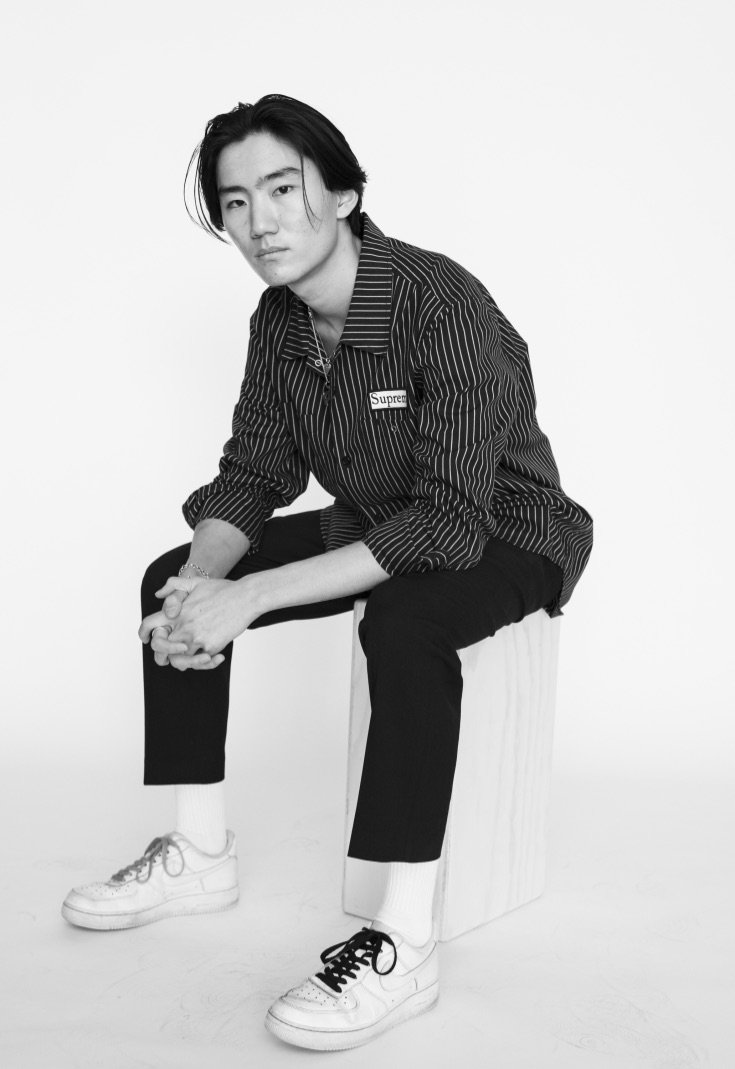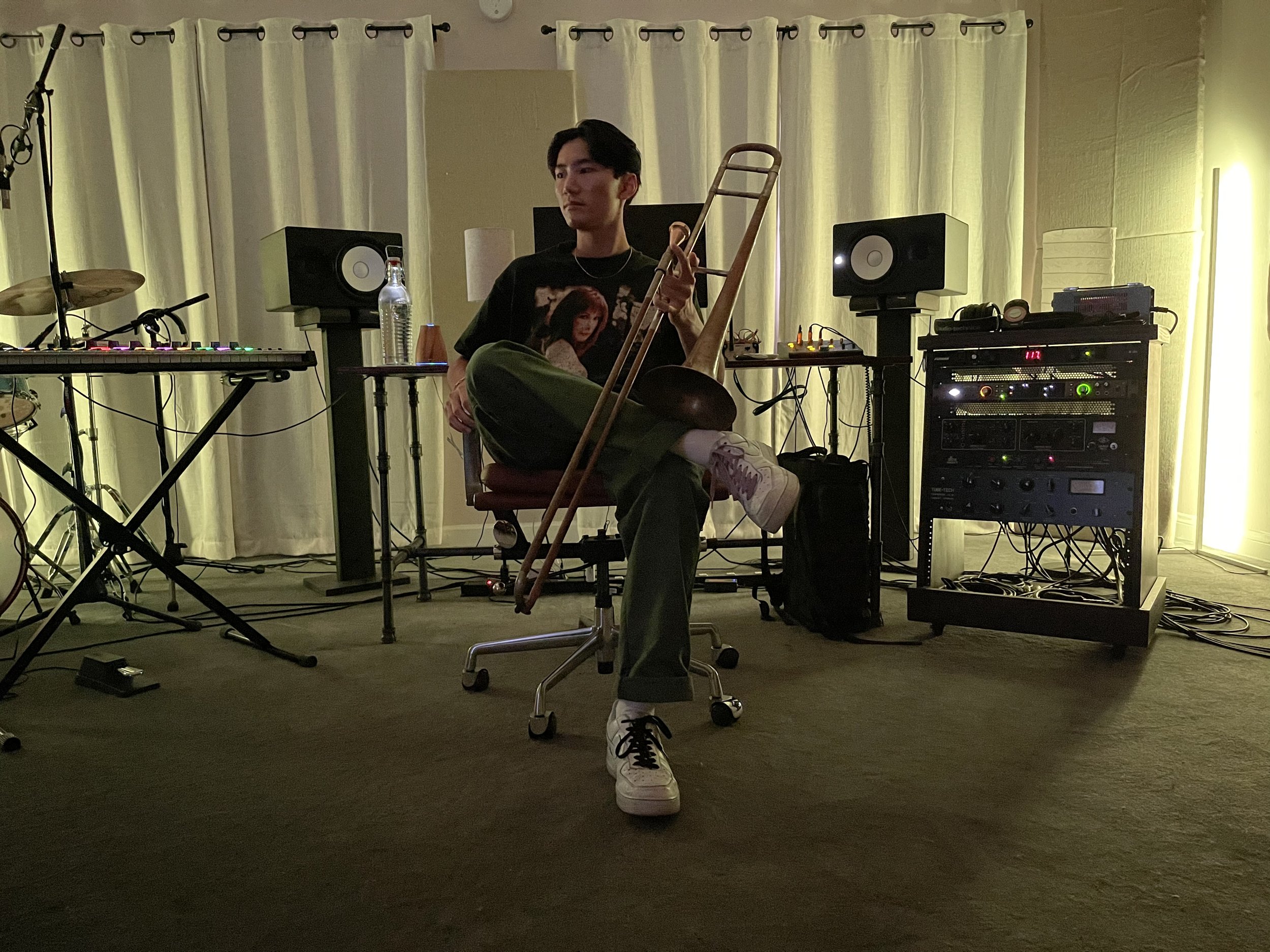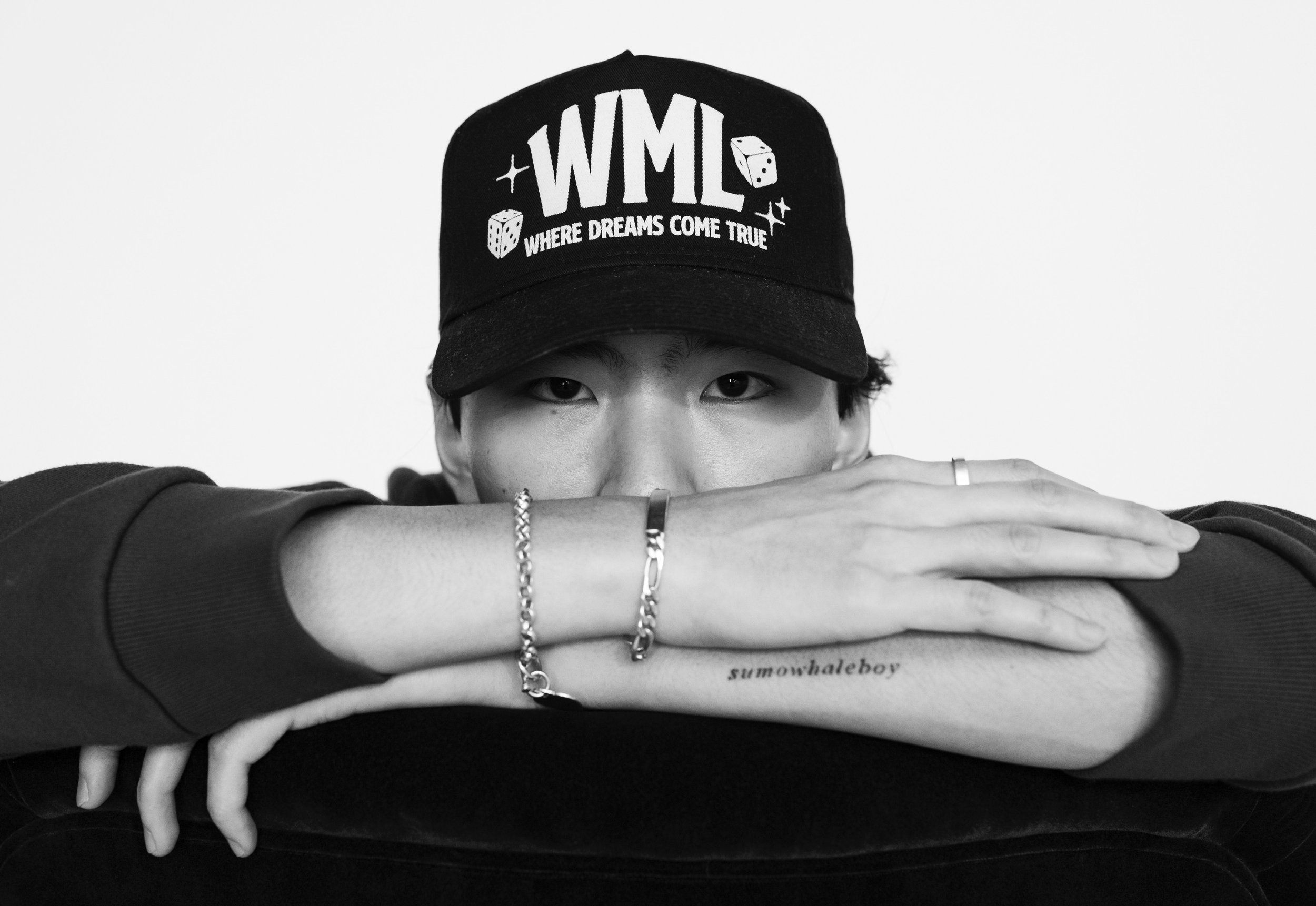Nick Lee: The Grammy Nominated Producer Behind Hit Songs on the Radio and TV
PHOTO by LORRIN BRUBAKER
If you have scrolled through TikTok in the past year, chances are you’ve heard the distinctive horns that characterize one of the most popular songs of the year “Industry Baby.” The mastermind behind the now-iconic horns is Nick Lee, a music producer, songwriter, trombonist, and composer. But during our chat, as he calmly sat in an office chair and introduced himself in a quiet but confident voice, you wouldn’t be able to tell that Nick crafted the horn loop to the energetic and catchy song.
Growing up in West Hollywood, the heart of Los Angeles, Nick was always surrounded by music. He started playing piano when he was six years old. In seventh grade, he joined a band, where he was first introduced to jazz music. His band director shared different aspects of trombone music with him, and that led to his discovery of jazz trombone.
“She was showing me all these different jazz trombonists and really piquing my interest in music, more than all the other activities that were there,” Nick shares, “And then it was just learning how to improvise with my friends and staying late after school to play. I would show up early to jam with my friends before class, and it was a very organic way of learning.”
Along with his trombone classes, he started learning to produce music by taking a workshop with one of his mentors and jazz teachers Jason Goldman. The weeklong crash course in production that Jason taught at Nick’s high school sparked Nick’s interest in music production. After that workshop, Nick began to learn music production by taking private lessons with Jason and watching YouTube videos.
PHOTO by MAX CHO
When Nick set off to The Juilliard School, a famous performing arts conservatory in New York City, for two years to further study jazz trombone, he continued to produce music on the side. But he slowly realized that Juillard wasn’t where he was meant to be; it felt like a bubble where he didn’t fit in.
In the winter of his freshman year at Juilliard, Nick’s grandfather passed away. For his grandfather’s memorial service, Nick and his cousin wrote and produced a song together to perform. The period of grieving and reflection made Nick recognize that he was no longer interested in staying in Juilliard; it was music production that he wanted to pursue more seriously. So, midway through his second year, he dropped out.
“I grew to dislike school because whenever you institutionalize music or any art form, it takes the fun out of it. But I did learn a lot from my time, and I'm glad I had that experience,” he says.
Post Juilliard, Nick spent six months building up his producing skills, finding inspiration in producers such as Take a Daytrip, D’ Mile, and Roget Chahayed. He moved back to LA and started working with his manager and longtime friend Max Cho. They met everyone they could–getting Nick's name out in the music industry–and inked a publishing deal with Scooter Braun at Atlas Music Publishing.
He found himself in rooms with Poo Bear and Demi Lovato, remarking on how the deal accelerated his career, “I was thrown in the deep end, going from producing smaller artists to working with top talent… Since then, we've just been keeping our heads down, and we're working hard.”
PHOTO by LORRIN BRUBAKER
Nick has since worked on numerous hit songs, including the Billboard chart-topping song “Industry Baby” by Lil Nas X. Having loved jazz music for a long time and hoping to infuse it in a song, Nick explains that the timing for “Industry Baby” could not have been better. He had recently started experimenting with horns and had made a whole sample pack of horn sounds. At the same time, Nas was looking for horns for an upcoming song. Nick’s manager connected him with Take a Daytrip producer Denzel Baptiste, and the rest was history.
The first time that Nick heard “Industry Baby” was when Lil Nas X leaked a small snippet of himself dancing to it on Instagram. Nick smiles to himself here; his excitement is tangible through the screen, and it’s the first time he has broken his calm composure all throughout our conversation.
“Just working with the [Take a Daytrip] guys was such a privilege–producers of that caliber, who are also genuinely nice and good. I also never anticipated all the success that it had. Because, you know, Lil Nas X is huge,” Nick explains. “A lot had to go right for the song to do what it did. Like, number one…they had to like the horns and they had to make a song over it. And then the song had to be good. And then the label might not have released it as a single. A lot of things aligned for it to take off like it did.”
PHOTO by KO AKA KOALA
Just as Nick is talking about the success of “Industry Baby,” Max interrupts our conversation.
“Hey, sorry to interrupt this. But as of 10 minutes ago, Nick was nominated–best Melodic Rap Performance–for a Grammy.”
Nick’s excitement is quiet but genuine. He smiles wide and googles the nomination to see for himself. (A few hours later, I learned that Montero, Lil Nas X’s album which Nick helped produce, is also nominated for Album of the Year.)
Now a Grammy-nominated artist, Nick leans back in his chair, fixes his cap, and calmly continues our conversation.
When I ask him about his experiences in the music industry as an Asian-American producer, he acknowledges that it isn’t always easy. “If you line up 10 producers, there are probably a bunch of white guys and then there’s me. If an artist must choose between all of us, nine times out of 10, they're not going to choose someone who looks like me because there are not that many Asian Americans in producing.”
Talking about his Asian-American identity was something he avoided early on in his career, wanting his work to stand for itself and be seen as a producer first. But he soon realized the importance of embracing that aspect of himself. He elaborates, “Max and I both understand K-pop and how music works in Asia better than a lot of my other producer counterparts who are white or who aren’t Asian. So, I can play to those strengths. And more importantly, one of my main goals since I started producing was to shed light on Asian Americans and help pave the way for more of us to be successful.”
PHOTO by KO AKA KOALA
For those following in his footsteps, Nick has some simple and actionable advice for entering the music industry without connections. He says to focus on genuine connection and “being a good vibe,” especially while growing your network. To build producing skills, Nick believes that it's better to not go to school, “It's best if you learn by yourself. You can learn how to score way better than any school can teach you from just YouTube or talking to people. If I were to do it over again, I would be on YouTube watching tutorials every day, reading articles. There’s even that Masterclass Series. I would be cold emailing composers to see if I could be an apprentice or they could be my mentor. Really learning by doing it, that’s the best method as opposed to learning in a classroom.”
Nick is personally following this “learn by doing” approach in his new endeavors scoring for TV shows like Welcome To Flatch on Fox and Grand Crew on NBC. Having never done this before, he reached out to one of his mentors Roger Neill about both the creative and business aspects of TV scoring. He quickly realized that scoring for TV is a different application of the same skill set used for music production.
“It's a different vertical of the same skill set. You use a different brain when you're making music to affect the tone of the scene. It's just fun to support what's going on in the dialogue and story,” he says. “I’ve learned that it’s also a bunch of trial and error. I'm still learning how to compose, and I'm on episode eight out of 10. It’s just fun to have another creative outlet.”
As Nick and I near the end of our conversation, I ask him what he hopes for in the next few years. He sits back to think. A few moments later, he leans forward with a small smile, sharing that he plans to continue learning in the future, further delving into composing for TV shows, all the while keeping doors open for those following his footsteps.
STORY MALLIKA CHENNUPATY




